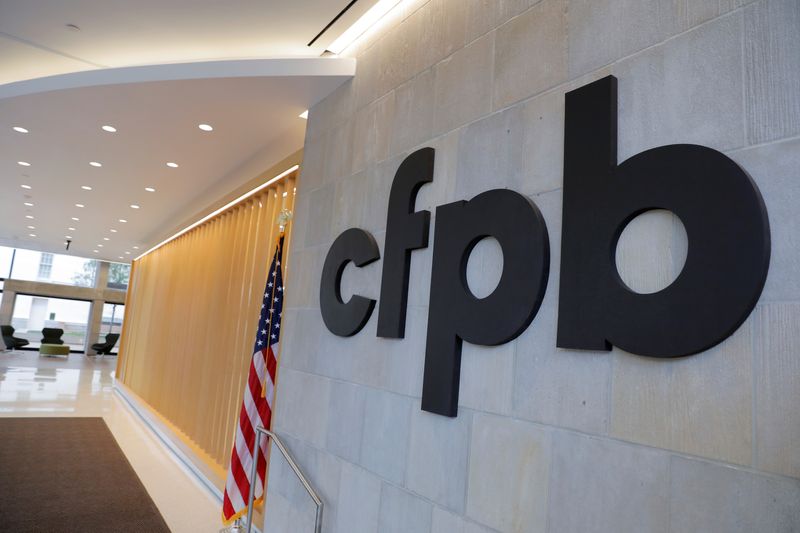US regulator says trade groups judge-shopped for credit fee lawsuit

FILE PHOTO: Signage is seen at the Consumer Financial Protection Bureau (CFPB) headquarters in Washington, D.C., U.S., May 14, 2021. REUTERS/Andrew Kelly/File Photo
By Jody Godoy
(Reuters) – The U.S. Consumer Financial Protection Bureau (CFPB) said business and banking groups, including the Chamber of Commerce, engaged in “forum shopping” when they sued in Fort Worth, Texas to block a rule aimed at lowering credit card late fees.
The CFPB urged a federal judge there to deny an injunction blocking the rule while the case is in progress. The regulator said the lawsuit is likely to fail in part because it was filed in the wrong place.
The late fee rule passed last week applies only to around 35 of the largest card issuers, none of which is based in Fort Worth, the regulator said.
Only one of the groups that sued, the Fort Worth Chamber of Commerce, is based in the court district, and the member it claims was harmed is a bank in Utah, the regulator said in court papers filed on Tuesday.
“Far-flung entities cannot just pay membership fees to an association in their venue of choice to gain access to that venue,” the CFPB wrote.
An attorney for the groups did not immediately reply to a request for comment on Wednesday.
The groups sued last week over the rule, which says that credit card issuers with more than 1 million open accounts can only charge $8 for late fees, unless they can prove higher fees are necessary to cover their costs. The previous rule allowed issuers to charge up to $30, or $41 for subsequent late payments.
The CFPB has said the change will save consumers $10 billion annually.
The business groups said capping late fees would cause irreparable harm through higher card losses and compliance costs for issuers, including on accounts they would have never opened had they known about the cap.
The case was assigned to U.S. District Judge Reed O’Connor, one of two active federal judges in Fort Worth and an appointee of former Republican President George W. Bush.
His rulings have included a 2018 decision declaring unconstitutional the Affordable Care Act, also known as Obamacare. That ruling was reversed on appeal.
The CFPB’s reply in the case came hours after the federal judiciary’s policymaking body approved a rule to curb “judge shopping” by requiring cases challenging federal or state laws to be assigned randomly among judges within a federal district and not just in the specific courthouse, or division, they are filed in.
Republican state attorneys general, companies and conservative activists have filed dozens of cases in small courthouses in Texas with one or two judges, seeking to block policies enacted under Democratic President Joe Biden, according to a Reuters analysis.








